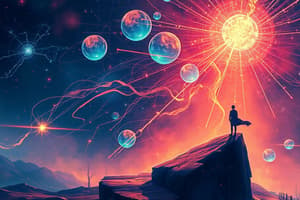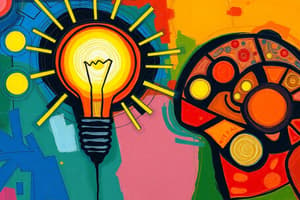Podcast
Questions and Answers
Who suggested the theory of flashbulb memory?
Who suggested the theory of flashbulb memory?
Brown & Kulik (1977)
What is the definition of flashbulb memory?
What is the definition of flashbulb memory?
Flashbulb memory is a special kind of emotional memory, which refers to vivid and detailed memories of highly emotional events.
Describe the biological support of flashbulb memory.
Describe the biological support of flashbulb memory.
More emotional events are better remembered; the amygdala plays a critical role in this process.
What is Neisser's theory about flashbulb memory?
What is Neisser's theory about flashbulb memory?
What was the aim of Neisser & Harsch's Challenger Study (1992)?
What was the aim of Neisser & Harsch's Challenger Study (1992)?
What were the findings of Neisser & Harsch's Challenger Study?
What were the findings of Neisser & Harsch's Challenger Study?
What was the aim of Brown & Kulik's Flashbulb Memory Study (1977)?
What was the aim of Brown & Kulik's Flashbulb Memory Study (1977)?
What did Brown & Kulik's study find regarding flashbulb memory?
What did Brown & Kulik's study find regarding flashbulb memory?
Flashcards are hidden until you start studying
Study Notes
Flashbulb Memory Overview
- Flashbulb memory is a vivid and detailed recollection of emotionally significant events, likened to a snapshot captured by a camera.
- Proposed by Brown & Kulik in 1977.
Biological Basis
- Modern neuroscience supports flashbulb memory, highlighting the stronger retention of emotional events.
- The amygdala plays a critical role in processing emotions and is located near the hippocampus, which is essential for forming explicit memories.
Neisser's Perspective
- Neisser contends that heightened emotions during an event may hinder accurate recall.
- Post-event information can alter memories, influenced by narrative frameworks related to individuals' experiences.
- Confidence in memory does not equate to its accuracy but can often be linked to the emotional impact of the event.
Challenger Study
- Conducted by Neisser & Harsch in 1992 to examine the reliability of flashbulb memory.
- Participants were quizzed on their recollections soon after the Challenger disaster and again two and a half years later, including confidence levels and prior exposure to such tests.
- Findings indicated that many students who felt confident about their memories were incorrect, suggesting flashbulb memories may not be reliable.
Brown & Kulik Study
- Brown & Kulik explored whether dramatic, personally significant events lead to flashbulb memories.
- Used a retrospective questionnaire on 80 US participants asking about their memories of learning about public events.
- Results showed a higher incidence of flashbulb memories for unexpected and personally relevant shocking events.
- Highlights the physiological imprinting effect dramatic events can have on memory retention.
Studying That Suits You
Use AI to generate personalized quizzes and flashcards to suit your learning preferences.




